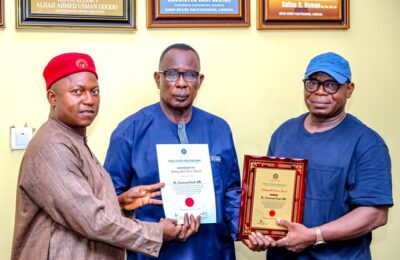Workplace or office for the future is gradually been challenged and shaped by emerging technologies and these changes must motivate businesses to navigate their operations alongside the changes to enable them remain sustainable and competitive.
Some of the tools of technological changesare:
1. Artificial intelligence (AI)
2. Automation
3. Data analytics.
These technologies or tools are not just to change how work are done, they are practically and essentiallyrestructuringor remodeling the business operations and the nature of work itself. In this write up, our desire is to try to explore the influence of these technologies on businesses, business leaders, employees, and the workforce, and to also discuss how organisations can adjust to succeed in this new age.
Artificial Intelligence: A Game Changer in Decision Making and Operations
Artificial Intelligence also known as AI is already transformingnumerousbusinesses, from telecommunications, banking, healthcare, buildings, financial sector, retail, and beyond. Automation processes can simplify complex tasks and analyses vast amounts of data. It can also drive efficiency, it can improve decision making, and optimise business processes. Machine learning algorithmswhich is one of the subset of artificial intelligence, for instance, can predict customeractivities, detectdifferent usage patterns, and suggestioncustom-made services based on past events, by doing this, customer experience is enhanced thereby increasing profitability.
How does this impacts business leaders? By embracing artificial intelligence can streamline business operations and drive growth through intelligent insights. Nevertheless, this may require a change of leadership styles which will include to focus more on data-driven decision making and encouraging culture of innovation in the organisation. The challenge for leaders is not only adopting these technologies but also ensuring that their organizations are prepared to manage and interpret the insights generated by artificial intelligent.
Automation: Enhancing Efficiency and Reducing Human Error
Automation is one of the key technologiesthat is restructuring the future of work. Repetitive type of tasks that requires human intervention like data entry, scheduling, and basic customer servicesare gradually being done by software and robots. Industries like manufacturing, logistics, healthcare, customer services etc requires automation, and it has become integral to improving efficiency, reducing operational costs, and enhancing service delivery.
How does this impact employees? There will be a shift in the types of job roles available. Because automation mightreduce the need for manual labor in certain areas, but in the same vain, it will also createopportunities for some other specialised job roles, like AI trainers, Data analysts, Data Scientist, Cybersecurity specialist and automation engineers. Employees may need to adjust by acquiring some new skill sets, particularly in the technology and digital literacy space, to remain relevant in this developing landscape.
Data Analytics: The Backbone of Strategic Decision-Making
Data analytics is gradually becoming thepillar of strategic business decision making across businesses. There reports that businesses that have leveraged data analytics which leads to understandingconsumer preferences, predict market trends and operational inefficiencies are better equipped to adapt and innovate in this clime. The ability of organization to process and analyse vast datasets in real-time, enables such organisations to make informed decisions faster, minimise business risks, and optimise available resources.
Though, the total reliance on data has its own challenges. Business leaders must ensure that data is not only collected but also analysed efficiently to mine actionable insights. Furthermore, establishments must address data privacy worries and uphold ethical values in their use of customer and worker data.
Implications for Employees: Upskilling and Adapting to New Roles
The major effect of this evolving technologies is basically on the labor force because some work functions may be replaced by automation and artificial intelligence, whilstnew job roles may also surface. The new roles will definitely require workers to have been upskill to be able to adapt and cope with the new technologies and innovations in the workplace. As businesses evolve, to introduce some advance technology into the work stream, employees must need to embrace continuous learning and become proficient in technologies like, machine learning, data analytics, AI and cybersecurity.
There must be a modification from our current traditional job roles to a more dynamic functions that could influence and demand creative problem solving skill, technical proficiency, and critical thinking. The future labor force must be flexible, adaptable, and tech-savvy to flourish in this new emerging technology environment.
Adapting to Change: Strategies for Business Leaders
Employee to successfully navigate the technological transformation, corporate leaders must adopt some listed strategies:
- Invest in Technology and Talent: Establishmentsneedto invest in technology and other skills drive digital transformation.
- Foster a Culture of Innovation: Encourage a culture where innovation and research are appreciated.
- Prioritise Employee Wellbeing: It is important for business leaders to ensure that employees are supported through the transformation journey.
- Leverage Data for Better Decision Making: Leaders must ensure they have the right tools to manage and analyse data efficiently.
- Adopt an Agile Approach: The speed of technological transformation requires businesses to be agile and responsive to changes.
Conclusion
The future of work is indisputably being enhanced and shaped by technology and innovations. While automation, artificial intelligence and data analytics bring opportunities for greater efficiency, innovation, and growth, they also require businesses to adapt to new ways of working. The key to thriving in this new era will be a combination of embracing technological advancements, upskilling the workforce, and fostering a culture of innovation and flexibility.
In our next column, we will be looking further into Data-Driven Decision Making.
– Aji, Jacob Onu is currently a Ph.D scholar in Information and Telecommunications Engineering and holds MSc. in information and telecommunications Engineering, an MBA, First Degree in Physics/Electronics. He has over 15 years expertise in information technology, business strategy, facilities management, Data Science and FMMC Ambassador. He writes about the intersection of technology, business, and innovation.




